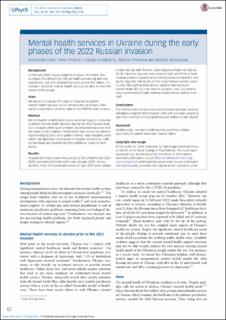| dc.contributor.author | Goto, Ryunosuke | |
| dc.contributor.author | Pinchuk, Irina | |
| dc.contributor.author | Kolodezhny, Oleksiy | |
| dc.contributor.author | Pimenova, Nataliia | |
| dc.contributor.author | Skokauskas, Norbert | |
| dc.date.accessioned | 2023-12-18T09:52:49Z | |
| dc.date.available | 2023-12-18T09:52:49Z | |
| dc.date.created | 2023-03-02T14:18:14Z | |
| dc.date.issued | 2022 | |
| dc.identifier.citation | British Journal of Psychiatry. 2022, 222 (2), 82-87. | en_US |
| dc.identifier.issn | 0007-1250 | |
| dc.identifier.uri | https://hdl.handle.net/11250/3107982 | |
| dc.description.abstract | Background In February 2022, Russia began its invasion of Ukraine. War increases the demand for mental healthcare among affected populations, but with devastating losses across the nation, it is unclear if Ukrainian mental health services are able to meet the needs of the people. Aims We aimed to evaluate the state of Ukrainian in-patient mental health services, which remains the backbone of the nation's psychiatric services, early in the 2022 Russian invasion. Method We conducted a nationwide cross-sectional study on Ukrainian in-patient mental health facilities during the 2022 Russian invasion. Using an online questionnaire, we obtained responses from the heads of 32 in-patient mental health facilities across Ukraine, representing 52.5% of all in-patient mental health facilities in the nation. We gathered information on hospital admissions, staff, humanitarian aid received and the additional needs of each facility. Results Hospital admissions were reduced by 23.5% during the war (April 2022) compared with before the war (January 2022). Across facilities, 9.6% of hospital admissions in April 2022 were related to war trauma, with facilities reporting percentages as high as 30.0%. Facilities reported reductions in staff, with 9.1% of total medical workers displaced and 0.5% injured across facilities. One facility reported that 45.6% of their total medical workers were injured. Although facilities across Ukraine have received humanitarian aid (such as medical supplies, food, volunteers), they reported additionally needing equipment as well as more staff. Conclusions The mental health service structure in Ukraine has been severely damaged during the 2022 invasion, with staff shortages despite a significant number of hospital admissions related to war trauma. | en_US |
| dc.language.iso | eng | en_US |
| dc.rights | Navngivelse 4.0 Internasjonal | * |
| dc.rights.uri | http://creativecommons.org/licenses/by/4.0/deed.no | * |
| dc.title | Mental health services in Ukraine during the early phases of the 2022 Russian invasion | en_US |
| dc.title.alternative | Mental health services in Ukraine during the early phases of the 2022 Russian invasion | en_US |
| dc.type | Peer reviewed | en_US |
| dc.type | Journal article | en_US |
| dc.description.version | publishedVersion | en_US |
| dc.source.pagenumber | 82-87 | en_US |
| dc.source.volume | 222 | en_US |
| dc.source.journal | British Journal of Psychiatry | en_US |
| dc.source.issue | 2 | en_US |
| dc.identifier.doi | 10.1192/bjp.2022.170 | |
| dc.identifier.cristin | 2130799 | |
| dc.relation.project | HK-dir - Direktoratet for høyere utdanning og kompetanse: 10049 | en_US |
| cristin.ispublished | true | |
| cristin.fulltext | original | |
| cristin.qualitycode | 2 | |

